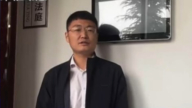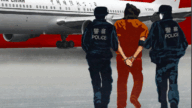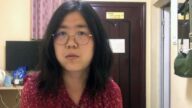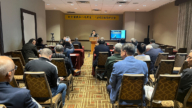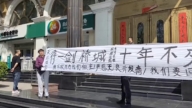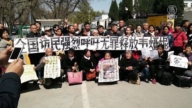【新唐人2014年01月06日讯】进入新的一年—-2014年,还不到一周,中共官员接连发声,提出要严抓网路舆论、坚持“党管媒体”、抵制所谓“反华意识形态渗透”等。分析认为,中共公信力的彻底坍塌,令当局如临大敌,因此对舆论的管控,有可能比去年更加严厉,但民众在经过短暂的噤声后,会再度酝酿新的人群和话语体系,通过新媒体再度发声。而当局任何形式的打压,都堵不住汹涌的民情和真实声音的传递。
据大陆官媒报导,中共当局在1月3号召开了全国宣传部部长会议,中共中央政治局常委,中央书记处书记刘云山,和中宣部部长刘奇葆分别在会上强调,将会在2014年严抓网路舆情工作,坚持“党管媒体”,牢牢掌握“领导权”和“话语权”。
而在此之前,中共“社科院”曾在2014《社会蓝皮书》中提到,“意见领袖”们在网络上的影响力,超过官方媒体和政府。
北京时政观察人士华颇:“由于时代发展、网路兴起,中共的声音已经不可能一统天下了。它也没法松动那些不同的声音,中共对网上意见非常恐慌,它认为民意都被网上不同的‘意见领袖’所主导,所以它才不停发布这些舆情指数,提醒中共高层注意不要丧失舆论的主导权。现在它一直是要打赢这个网路战,它认为网路阵地已经失守,所以一定要把这块阵地给夺回来。”
美国“纽约城市大学”政治学教授 夏明:“中共最恐慌的就是失去了对老百姓思想的控制。所有的官方的媒体公信力现在基本上不存在了。”
对此,与中共当局关系密切的大陆最早互联网舆情研究机构——“人民网舆情监测室”,在最近发布的《2013 年中国互联网舆情分析报告》中提出,对于微博粉丝数超过10万的律师、学者、企业家等意见领袖,应采用中共“统一战线”手法,以减少他们对体制的对抗性。
这一建议,恰好与刘奇葆在会议上提出的“加强意识形态领域的引导和管理”不谋而合。但评论人士普遍认为,当局想法过于异想天开。
华颇:“我想这是中共一贯的手段,但是这种手段效果是很值得怀疑的,因为民愿在此,所以你不顺应民众的要求,你只想把一些大V给统战了,我看也是不可能,因为这些大V之所以成为大V,那是因为他代表了民意,如果大V要是为中共所用的话,他的民意也会消失,他的大V也就是一般人。”
在中共两位高官发出要占领网路阵地的同时,公安部部长郭声琨也在中共喉舌媒体《人民日报》高呼,坚决抵制所谓“西方反华势力”的“意识形态渗透”。有外媒评论认为,官方的态度表明当局不但在管理意识形态、限制言论自由、和新闻自由方面再度升级,而且已经将“维稳”的方向转向了海外。
美国“纽约城市大学”政治学教授夏明指出,随着互联网的快速发展、国际化节奏的加快,以及人们受教育水平的提高等因素,越来越多大陆民众有机会了解和接触国际社会,大量客观真实的资讯,使得人民对“一言堂”的谎言洗脑产生了怀疑,这恰恰是中共当局最担心害怕的。
夏明:“我们看到中国有许多人群现在是‘翻墙’阅读国外的媒体和消费国外信息。另外,在国外,也有系统的帮助中国‘翻墙’的各种组织,这种情况下,对中国舆论控制或者洗脑来说,不仅有国内意见领袖的影响和冲击,另外还有整个国际大环境,包括全球的新闻媒体,还有各种政府组织和非政府组织,其实都对中国防火墙啊、电子长城啊形成一种冲击力。”
北京时政观察人士华颇预测,当局任何形式的打压,都堵不住汹涌的民情和真实声音的传递。民间在经过短暂的噤声后,还会通过新媒体,再度酝酿新的人群话语体系。
采访/易如 编辑/张天宇 后制/李智远
CCP Strengthens United Front And Internet Censorship
As a new year’s resolution, Chinese Communist Party (CCP)
officials declared they would tighten Internet control,
insist on party controlled media, and reject the infiltration
of anti-Chinese ideology.
Analysts believe the CCP has completely lost its credibility.
Fearing a collapse, freedom of speech will be further
suppressed more severely than last year.
However, analysts believe after a brief period of censorship,
the crowds will again mobilize and expression will evolve.
Any form of suppression will not last long,
and the true voices will be heard.
The CCP run media reported that at the Jan. 3 national
meeting of publicity department heads from across
the country, Liu Yunshan, secretary of the Secretariat
of the CCP Central Committee and Propaganda Department
Director Liu Qibao emphasized that in 2014 there will be
a tightening of Internet censorship.
They demanded that media must be controlled by the party
and that the party have a firm grip on the CCP’s authority.
In its “Social Blue Book: 2014 Society of China Analysis
and Forecast," Chinese Academy of Social Sciences explains
that national opinion leaders have more influence
on the Internet than the media and government.
Hua Po, Beijing politics analyst: “The CCP can no longer
control opinion in the Internet era.
Those voices can not be shaken.
The CCP is frightened by the dominating role
of Internet opinion leaders.
The official’s remarks are to remind the CCP
to dominate the media.
Now they are engaging in an Internet battle which they
believe they must win in order to recapture their leadership."
Xia Ming, Professor of Political Science, City University
of New York: “What frightens the CCP most is losing
control of the people.
The CCP run media credibility is basically nonexistent."
A 2013 people.com.cn Internet monitoring program report,
Chinese Internet Public Opinion Analysis, proposes to adopt
a united front in order to reduce adversary from outspoken
internet users with more than 100,000 web fans,
such as lawyers, academics and entrepreneurs.
This proposal coincides with Liu QiBao’s address
at the national meeting regarding ensuring the direction
and management of ideology.
However, this theory is considered to be over-idealistic.
Hua Po: “I don’t think this routine tactic of the CCP
is going to work.
The wish of the people cannot be disregarded.
There is no way they can control the Internet leaders.
They have become leaders because they represent the people.
Once they speak for the CCP, they would lose their fans
as well as their leadership on the Internet."
Along with the talk of occupying the Internet battlefield,
Minister of Public Security Guo Shengkun also claimed
in a “People’s Daily" article that the infiltration of Western
anti-China ideology must be resolutely resisted.
Foreign media has interpreted this claim as meaning
that the CCP has not only upgraded its ideology management
and censorship, but also shifted its stability maintenance
overseas.
Professor of political science Xia Ming indicates that in the
Internet era, the pace of globalization and education has
provided the opportunity for the Chinese to learn about
and have access to the international community.
Chinese now come into contact with a massive amount
of objective and true information, raising questions about
the rule of the one-party system.
That is exactly what the CCP fears the most.
Xia Ming: “We know many Chinese bypass the Internet
blockade and read news from foreign sources.
With so many systems available to breach Internet firewalls,
the CCP censorship and brainwashing is under attack
by the various domestic opinion leaders, the international
media, as well as government and non-government agencies."
Beijing political analyst Hua Po indicates that any forms of
suppression will not stop the spread of public sentiment.
New media will evolve and new dialogue will occur after
a brief silence.
Interview/Yiru Edit/Zhangtianyu Post-Production/Lizhiyuan


